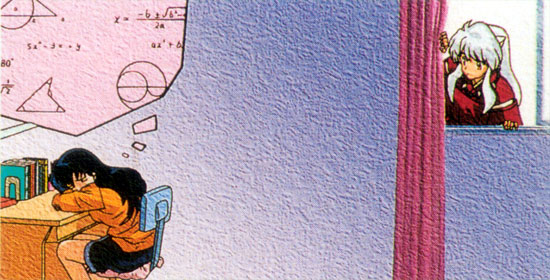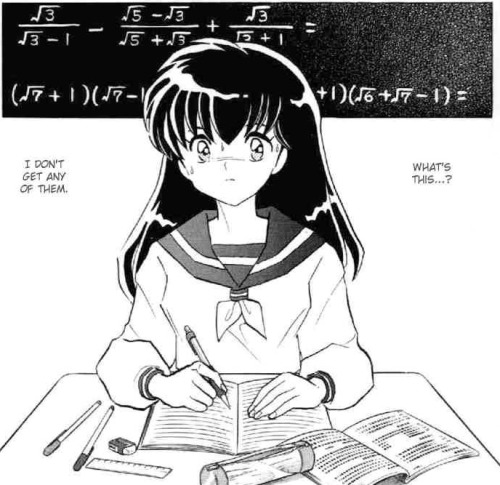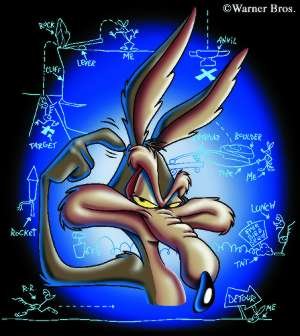
Yes, this is another late post. My apologies. I took assessment tests at Wossamotta U. last night, and when I finished it took me awhile to consider how I wanted to write this down. The experience was an unusual one for me. It revolves around my plans to take algebra courses this fall.
I've taken algebra four times before. Twice in junior high, once in high school, and once in college. Being a gestalt learner, I tend to examine systems and how they operate as a whole to learn them. Alas, this is not how any of my old classes were taught.
"Don't try to understand the whole thing, it's too big for you," the instructors kept saying. "Just memorize what we tell you long enough for the test. You're making it too hard. Take it one piece at a time, without any context or comprehension, and just do what you're told."

Faced with what was essentially gibberish without context or intrinsic value, I found that blind memorization and regurgitation of math rituals was useless to me. This was before widespread recognition of different learning styles (at least where I attended), so it was left to me to piece things together as best I could. As a result, I didn't do well and walked away frustrated class after class, having learned almost nothing. I was good at math once, I thought. What the hell happened?
Shortly thereafter, I happened upon a book entitled Symbolic Logic, by Prof. Charles Lutwidge Dodgson. And I can almost guarantee that you are familiar with some of his other works . . .

That is correct. His pen name was Lewis Carroll. His Alice works are lovely expressions of both poetry and mathematics, as well as being children's stories. However, much as he loved the little girls for whom he wrote his stories he was first and foremost a mathematician. Symbolic Logic was an introduction to the philosophy and language of mathematics, the utilization of symbols as abbreviations to better condense logic problems from a purely linguistic form to a symbolic one. I had known for years that to solve a logic problem one must be able to simultaneously look at it all at once and be able to part it out. As I started reading his book, I realized that this was what was missing. His book explained how higher mathematics, such as algebra, were simply linguistic tools for logical problem solving.
As you might imagine, my heart soared. I drank down his book, seized upon the key it offered, unlocked the door and entered the garden. It really is all a matter of perspective. Years later, when I was homeschooling my own Magnificent Offspring, I spent quite some time working with them on symbolic logic before we started in on the algebra texts I had. Things seemed to go well, and I think retention was good.
Fast forward a few more years to present day. The Magnificent Offspring are now in public brick-and-mortar schools. I, a returning student, must now take my Assessment Tests for placement in the college program.
(Yes, I'd just taken three semesters of classes, as you've already read. It's a bit of a tangle. Suffice it to say, in my life things often work backwards. Roll with it.)
I took the English test first, and owned it as expected. However, there was also the math test. I knew that there were many things, though once considered algebra, that are now taught as basic math. Likewise, things that were once reserved for higher college math classes are now part of high school algebra. I therefore intended to qualify for an elementary algebra course, to be sure I had the basics down. Then I would move through intermediate algebra to college algebra. When I reached my 4-year campus, I would have a thorough comprehension of algebraic rules and rhythms and be well-prepared for a comprehensive approach to statistics class. I reviewed for the test with this in mind, using the college's pre-algebra practice tests accordingly.
When I finished the English test, there seemed to be enough time left, so I started the math test. "The better you are," I was told, "the longer it takes." I didn't expect to take too long.
The first few questions were a little unexpected. "That's odd," I thought. "there was nothing like this on the practice tests . . ."
From there it went to a few equations I hadn't worked on since I was in college last, over two decades ago. "Hm," I thought. "All right, I think I can figure this out . . ."

From there it quickly went to questions I had never seen before in my life. So I spent most of the test scribbling furiously, figuring out how to solve the problems as I went. Often I was wrong. But since the test was multiple choice I could then deconstruct my work, find the pattern offered, and arrive at one of the listed answers. I got enough right that the test just kept going and going. It was even fun.
The last few questions I rushed through because the testing centre was closing - if I'd had more time, I might have gotten them correct. But as it was, the test kicked me out just before the systems shut down for the night. The printer buzzed and spat, showing a score that qualified me to go straight to college algebra.
This is the sound of my brain... pulse, throb, pulse, throb...

I know there is a huge difference between an understanding of algebraic thought sufficient to work through a multiple-choice test, and a firm foundation in mathematical technique. If the test had been fill-in-the-blank I would not have done nearly so well. So in practice, I don't know that I will start out with a college-level algebra course. I will meet with a counselor before truly deciding. Still, it is nice to know that my analytical and problem-solving skills are in such good shape. And it is a rare thing that, considering my ego, I manage to surprise myself in such a fashion.
Sometime again,
--Coyote.
(Kagome and Inuyasha are both characters created by Rumiko Takahashi; Coyote pic courtesy of malayna-dawn.typepad.com, combining Warner Brothers' Wile E. Coyote and the Coyote from the Medicine Cards illustrated by Angela C. Werneke; The Brain From Planet Arous was written by Ray Buffum, thanks to denofgeek.com for the picture; Alice, the Mock-Turtle, and the Griffon are of course productes of Lewis Carroll, aka Charles Dodgson. All rights reserved by those who rightfully reserve them.)
No comments:
Post a Comment